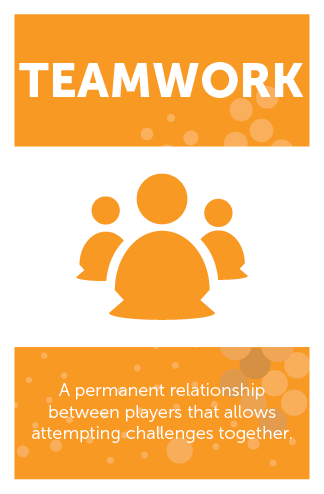Teamwork Category #gamemechanics
A permanent relationship between players that allow them to attempt challenges together.
Building teams, guilds or any sort of group that will keep the players together facing challenges is an awesome way to promote cooperation and develop professional relationships within the system.
It occupies a different dynamic as teams can compete against each other and it’s very different to define the rules on how players can cooperate with others than if they face challenges together or against each other.
Teams must give the players a sense of belonging. Wether you are a citizen in a country or you subscribed to a fanclub you share the same objectives. This is the type of relationship you want to develop with teamwork in gamification.
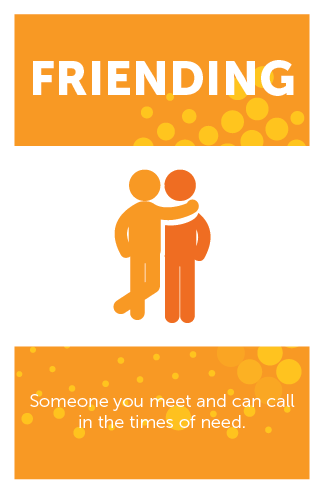
We all have friends right? As a #gamemechanic, FRIENDING is used to show the players they have people they can call any time to help them. In the category description it’s stated that teamwork is a form of permanent relationship. Think of your friends in facebook and how the relationship work:
- Only your friends can see your posts and photos
- Only your friends can send you messages
- You can only invite YOUR friends to your events, or maybe friends of friends
The point is that nobody is in constant contact with ALL their friends on facebook, however, you know that you can contact them as long as you are friends with them.
The same concept applies, the difference lies on how to use such friendship.
- Only friends can buy your products
- Only friends can see you online
- Only friends can trade items
- Only your friends can hire you
Remember: everything is more fun with others.
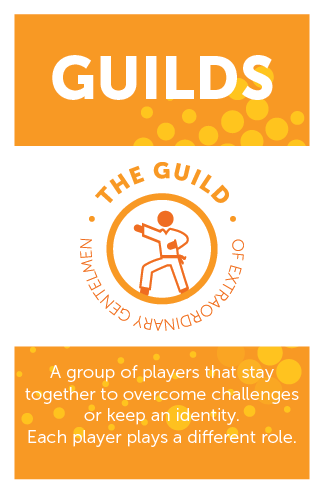
It matters not how you call them: TEAM, GUILD, GROUP, ASSOCIATION, COMPANY, WHATEVER. Guilds should always represent a common goal. Players who are part of the same team must share the same objectives. Usually, each player fulfills a different role in the group and so their job is always required to do something.
In guilds players not only share their views but may find friends, mentors, students and many other rewards that cannot be found outside.
The relationship between the players in the guild can be tricky. The environment can be of cooperation or competition (Rule number 1 of Fight Club)
In the end we all want to be part of something bigger. This mechanic appeals A LOT to purpose in the RAMP model.
Oh. Almost forgot. Players can belong to multiple guilds unless stated otherwise, because, why not?
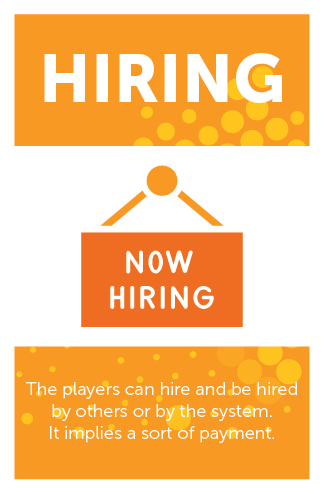
Ever wondered if the kid who always got the homewrk right could be hired to do it for you?
How about we exchange some virtual money that was earned through 10 different tasks and now can be used to give other players some money so they can buy a better grade or get that new item they want?
Hiring can be VERY powerful but must be used with caution. You could end up with the “rich” kid wanting to REALLY py other players fr their work, however, if done right, it ends up becoming something as self-regulating as E-BAY or Air B&B.
This mechanic is connected with the POWER reward from the SAPS model. If a player CAN hire others, it means they have the power to do OTHER things and develop whatever they are on to.
Now, the KEY challenges each player MUST face shouldn’t be “hirable” (if that’s a word). Make sure that players’ challenges are balanced and the key elements in the journey are done by who must do it.

Bernardo Letayf
M.B.O. (Mind Behind the Operation)
6th position in the Gamification Gurus Power 100!
Gamification Keynote Speaker & the mind behind the operation @bluerabbit, a gamification platform for education.
Developed three frameworks to teach/learn how to create gamification systems and build gamified content
Declared a world wide war on grades.

